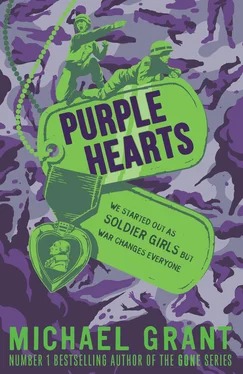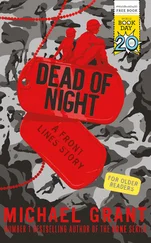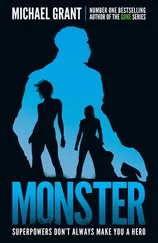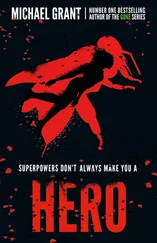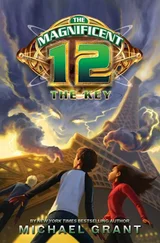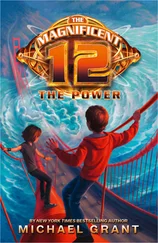Frangie shrugs. “Not in this weather, but I hear the same latrine rumors you do, Moore.” It’s perhaps more curt than she intends—she is feeling better . . . better, but not exactly fresh as a daisy. Her mouth tastes like a dead squirrel. And while the rain has slowed, the wind is still whipping water off the deck to sting Frangie’s cheeks.
“Yeah.” Moore is silent for a long while. “Some of the boys are worried. Not scared, exactly, just worried. They’ve heard stories about panzers. How our 76s just bounce off their armor and their 88s go right through ours.”
Frangie looks at him in surprise. Not because worry is unusual—a GI who doesn’t worry about going into battle should be Section Eight, mustered out as crazy. No, it’s the fact that he is confiding this to her. Is it because she’s a woman, or because she’s a medic?
Then it dawns on her: despite carrying a medical bag rather than a rifle, Frangie is a veteran. And Moore is not. He’s seeking reassurance. And not just for “some of the boys.”
“I suppose the air corps will have destroyed a lot of the panzers by the time we even get there,” Frangie says.
Moore snorts derisively. “Air corps. We’ll be lucky if they don’t bomb us.” Another silence. “They’re just nervous is all. Some of the boys. They don’t know what it will be like.”
Neither do you, Moore.
“I guess it’s better to have all that armor plate around you than just be walking along like infantry,” Frangie suggests.
Moore shakes his head. “Infantry can dig a hole. A tank? See, Doc, a tank is a big fat bull’s-eye. A prize! No Kraut tank driver goes around bragging about how many infantry he killed; he wants to kill tanks. Heck, I want to kill tanks! I want to go home someday, prop Tom Trey—that’s his nickname—up on my knee and tell him how Daddy wiped out all these panzers and saved the day! Problem is, old Fritz over in that panzer has better armor and a heavier gun than I do.”
And more experience .
And his own children to whom he too would like to brag.
“They teach us that most wounds are superficial, and most fellows don’t get hurt at all,” Frangie says, squeegeeing rainwater from her eyes.
She doesn’t know how to reassure Moore. In her first artillery barrage she had seen her friend, Doon Acey, a boy from back home, spill his intestines like fat sausages falling from a split grocery bag. She’s seen traumatic amputations, chest wounds, head wounds, and the bullet to the left foot that is the signature of a soldier looking to escape the war by any means available. She knows the statistics and they’re true enough, but she’s held the hands of the dying, and she is all out of optimism.
“They say this new Tiger tank the Krauts have . . .” Moore makes a low whistle.
“They say lots of things.”
“Yeah. I guess that’s so. The only thing is, Doc, I’m . . . some of the boys are real scared of burning.”
“Burning?”
Moore shrugs. “You know what the Limeys say? They call it a ‘brew up.’”
“That’s when they’re making tea,” Frangie says. “They call that a brew up.”
Moore shakes his head. “Not when they’re talking about a tank battle. Your tank catches fire, that’s a brew up. Men trying to get out of the hatches. Maybe our own Willy Pete going off.”
“Who’s Willy Pete?”
“Willy Pete. WP. White phosphorous. We carry some white phosphorous rounds, you know, to make smoke. But if the Willy Pete gets on you, you can’t put it out, see. It’s like glue that just burns and burns and burns, all the way down to the bone.”
Now Frangie definitely wants out of this conversation. She cannot reassure him because of all wounds it is burning that frightens her the most as well. The very thought of it makes her heart race with fear. She glances around, hoping for an easy escape.
“I wouldn’t want to live if I got burned bad,” Moore says.
And suddenly Frangie has the feeling the floor is slipping away for a whole different reason.
“We give you morphine and—”
“I don’t want to burn in a tank, Doc. None of the boys do. I mean, if you find me in that, you know, condition , I wouldn’t mind at all if maybe I got too much morphine. If you understand me.” He laughs insincerely as if it’s a joke.
“Sergeant Moore,” Frangie says firmly, “I’m just a bedpan commando, I’m not God. My job is to keep you alive, not to kill you.”
Moore stiffens and tilts his head back to look down his nose at her. “I wouldn’t expect you to understand. You’re a woman.”
“Right. Goodbye, Moore,” Frangie says and walks away.
The conversation is disturbing, but what strikes her now is how she had the nerve to just turn her back and walk away. That is definitely not typical of Frangie Marr. All her life she has been soft-spoken, kind to animals, deferential to older people, deferential to men, and above all, deferential to white folks. That’s just common sense and decency, with that last bit being simple self-preservation—no colored girl growing up in Tulsa, Oklahoma talks back to a white person, not if she wants to reach old age.
Deference has in many ways defined Frangie’s life. She has ambitions, but can’t speak about them because it isn’t her place to have high and mighty aspirations. All her life Frangie has given way to her parents, her pastor, her elders, her teachers, men and white people.
Moore is a colored man, not white, but he is older and he is a man. And yet, Frangie just turned her back and walked away. The realization adds a little swagger to her step, which causes her to trip and very nearly plunge down one of the many steel stairs.
She heads below to the main hold, the bright-lit steel cube at the heart of the LST, with its cargo of tanks. There are seven hulking Shermans, parked with trucks and half-tracks and jeeps between so as to distribute the weight.
Most of the tanks have slogans or names painted on the side or in some cases on the main gun. Harley’s Harlots. GI Jane. Red Hot. One is named Nat Turner. Frangie wonders if the white generals know that Nat Turner launched a slave rebellion that ended up killing a whole bunch of white people. One of the tank commanders is being a smart aleck, and it brings a sneaky smile to Frangie’s lips which, once upon a time, might have pursed in disapproval.
Weeks spent listening to her radical big brother Harder have not turned her into a Communist—they are atheists after all, and Frangie goes nowhere without her Bible — but it has forced her to see things a bit differently. All her life Frangie has moved to the back of the bus or trolley. All her life Frangie has known to look for the signs that say, “No Colored,” or signs that designate special colored drinking fountains, colored bathrooms. This giving way, this automatic acceptance of white superiority, will have to resume when she goes home. The medic with the Silver Star for bravery, the young woman who time and again has run into the line of fire to save a life, will have to be . . . meek .
That meekness had always come naturally to Frangie. But meekness cannot be a part of what she does now, what she will soon have to do. There is no such creature as a meek combat medic.
On the LST are multiple holds on either side of the main deck, each a version of the puke-reeking box where she had made her rounds earlier. Her own niche is a small space that is the seagoing barracks of the medics, nurses and assorted medical technicians assigned to go ashore with the battalion and establish a field aid station, once the beach is secure.
Frangie has volunteered to move up with the advance elements rather than be stuck working with supercilious doctors and bossy nurses at an aid station or field hospital. It’s more dangerous, but it’s also more independent, and she’s come to value independence. She will trail the advance in her own jeep with a driver, Corporal Rosemary Manning. Manning is nearly six feet tall, taller than most of the men, and makes an unlikely sight alongside the diminutive Frangie. The jeep has red crosses against white circles painted on the sides and the hood, a very different sort of armor that relies on the enemy to honor the sanctity of the medicos.
Читать дальше
